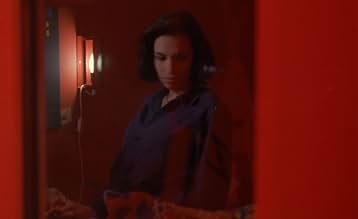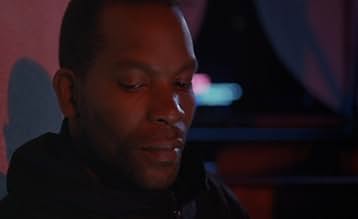IMDb RATING
6.8/10
1.5K
YOUR RATING
A serial killer terrorizes Paris at night, but that doesn't stop Daïga and Théo from meeting up, and falling in love.A serial killer terrorizes Paris at night, but that doesn't stop Daïga and Théo from meeting up, and falling in love.A serial killer terrorizes Paris at night, but that doesn't stop Daïga and Théo from meeting up, and falling in love.
- Director
- Writers
- Stars
- Awards
- 3 nominations total
Yekaterina Golubeva
- Daiga
- (as Katerina Golubeva)
Danièle Van Bercheycke
- Fleur
- (as Danielle van Bercheycke)
- Director
- Writers
- All cast & crew
- Production, box office & more at IMDbPro
Featured reviews
I enjoyed this film that had beautiful images of the male body, and a colorful mix of characters. Although the director, Claire Denis is a straight, white, woman, the film is full of homosexuality images. These images are done artfully however, do not limit the films appeal to a wide range of people. Although a serial killer is loose in Paris, this film is not a classic thriller, in the sense that the viewer does not feel on-edge, and actually might feel comfortable with the killer as did I. I would recommend this film as a good peek at what it is like to be an outsider in Paris.
This is a very strange film, indeed. In the plot there's something about a Latvian immigrant in Paris, a couple of homosexuals, an old lady's murderer, some African immigrants (I think they're from the Maurice Islands), a woman who is a hotel manager and protects the young Latvian, a transvestite who has his own show on a nightclub, and some other crimes and weird stuff.
But it's not a bad movie after all. Despite the confusing plot, the film has some very nice sequences, some shocking scenes and one of the most beautiful actresses I've ever seen, Ms. Katherina Golubeva, whom I'd never heard about before this film. If you have a lot of time to spend, and you're in the mood for an unusual motion picture with a gorgeous young actress, "J'Ai pas Sommeil" is a good pick.
But it's not a bad movie after all. Despite the confusing plot, the film has some very nice sequences, some shocking scenes and one of the most beautiful actresses I've ever seen, Ms. Katherina Golubeva, whom I'd never heard about before this film. If you have a lot of time to spend, and you're in the mood for an unusual motion picture with a gorgeous young actress, "J'Ai pas Sommeil" is a good pick.
Writer-Director Claire Denis is telling a pretty strange tale in her "J'ai pas sommeil." Reportedly inspired by real-life news events, the focus is on an unsavory series of murders in a large French city, and various people somehow related to these happenings. These folks do not all know one another or even, in some cases, come in contact with each other. More strangely, Denis incorporates a few people who don't seem to be related to the events at all. The film's structure is free form, and various scenes are deliberately presented in a disjunct manner. There is some interest generated in trying to figure out what's going on, and in fact, there are a couple of coldly frightening scenes of calculated murder. I found myself not being attracted to nor empathizing with any of these characters. I merely observed with some interest. The general viewer response will depend on personal preferences. All in all, I found this ultimately to be a very slightly above average film work.
J'ai pas sommeil gets off to a shaky start, with laughing cops and bland-faced Katerina Golubeva driving her rattle-trap Soviet car around Paris, but soon settles down to an absorbing study of greed and murder. Most of the characters are expatriates, some from eastern Europe, some from Martinique, and all are caught up in the search for happiness in a difficult environment (Paris can be hell for outsiders, as Balzac and many other artists have told us).
At first you aren't aware that it's a murder story: you don't see a woman being strangled and robbed until 64 minutes have elapsed, but Denis holds our attention with atmospheric scenes of the gay sub-culture that Camille moves in. She brings out the voluptuous, narcissistic aspects of this world very well. The performances are all good. Richard Courcet as Camille has little to say, but his body speaks eloquently. Alex Descas and Beatrice Dalle are veterans of Denis's films and are effective as the couple with a child. Theo delivers furniture by day and plays violin in a band at night; he wants to go back to his native Martinique but Mona isn't at all sure about this. Line Renaud does a great job as Ninon, the hotel manager who lovingly deals with all these star-crossed souls. I had to go to YouTube after the credits to hear Line sing Ma cabane au Canada and Frou-Frou... she is wonderful.
At first you aren't aware that it's a murder story: you don't see a woman being strangled and robbed until 64 minutes have elapsed, but Denis holds our attention with atmospheric scenes of the gay sub-culture that Camille moves in. She brings out the voluptuous, narcissistic aspects of this world very well. The performances are all good. Richard Courcet as Camille has little to say, but his body speaks eloquently. Alex Descas and Beatrice Dalle are veterans of Denis's films and are effective as the couple with a child. Theo delivers furniture by day and plays violin in a band at night; he wants to go back to his native Martinique but Mona isn't at all sure about this. Line Renaud does a great job as Ninon, the hotel manager who lovingly deals with all these star-crossed souls. I had to go to YouTube after the credits to hear Line sing Ma cabane au Canada and Frou-Frou... she is wonderful.
10lwong
"I Can't Sleep" opens with a shot of policemen laughing in a helicopter above Paris, a scene Denis says has no narrative function. The helicopter doesn't blow up or crash (as we half-expect, so Hollywood-trained we have become). We never learn why they are laughing, and it never comes up. but it immediately sets a tone of ordinariness about something that is so freighted with allusion - that police work is all dark violence and angst and frayed tension. Police work also includes ordinary moments between two people.
"I Can't Sleep" follows three sets of characters who come to be loosely linked. First is Daïga (Katerina Golubeva, an unknown with an exotic resemblance to Michelle Pfeiffer) who drives away from Lithuania and into the Paris ring in her boxy, smoking car. She has only vague ideas about what she wants other than to let Paris wash over her life. for the time being, she finds a tenuous niche in the émigré community working indifferently as a maid in a second rate hotel. Among the hotel's residents is Camille (another unknown, Richard Courcet as a drag hoodlum with a brooding boredom) who, with his friends and lovers, leads us through the gay subculture. And there is Theo, Camille's good brother who struggles the struggle of the unFrench emigrant class in neoconservative France. As we stay with these characters, we see a Paris that isn't a backdrop to romantic comedies like "Forget Paris" or "French Kiss." In the course of "I Can't Sleep" we get a sense of the shape of some of the other kinds of lives that are lived in Paris. We begin to move to the film's rhythm. At intervals are arresting set pieces that attenuate reaction. These subtle departures don't break the film's basic form, but they do break the mood of the expected. We get to laugh and be aware that we are laughing. We marvel at small things and know we are marvelling at them.
In "I Can't Sleep," newspaper headlines scream about a sociopath who is going around murdering and robbing solitary old women (based on a true case). Denis illustrates for us what we know to be true - that mostly people are unaffected. Everyone's lives continue to be lived routinely, each with their own personal life traumas that fill their days. By chance, the murders intersect our characters' lives and we see their reactions to it. There aren't any obvious cues for us. We watch Daïga as she learns who the murderer is. What she does and what happens as a result is less important than the almost wordless scene they share when she follows him. Something essential passes between them, but what that is is up to you. It's as much based on the experience you can bring to it and what abstractions you can add to the moment. Likewise, Theo's face is a dispassionate mask - it begs us on to project our reactions to his life circumstances.
This is a tenuous connection, a lot for Denis to ask of her audience, and it may not engage many or even most of those sitting out there. In a way, you have to have a ready state of mind to watch it. It reminds me most of Kryzysztof Kieslowski's "Red" and the conversations I had about it. More than a few friends said they couldn't suspend their qualms about the believability of the relationship between Jean-Louis Trintignant's character and Irene Jacob's. It was too far from convention (age difference) and lacked a believable basis (he was just a weird old guy, and what did they share anyway?). But for me, I loved it because his character seemed the tragic sum of all the characters I have seen Trintignant play (especially in "A Man and A Woman," "Z," "The Conformist" among others). Here was the same good man, now ruined at an advanced age, and I was meeting him again. I felt I understood him fundamentally, knew what he had gone through to reach this sour moment in his life and because of this, it was easy for me to project my understanding onto Jacob's character. I thought, "Of course she loves him."
Anyway, "I Can't Sleep" is, at its best moments, a collage of sometime odd elements that is somehow perfectly composed (like in "Paris, Texas" and "Wings of Desire," and in Kieslowski, especially, "Red" and some of the Dekalog episodes like "Thou shalt not bear false witness"). One can't explain why it seems right, but everyting certainly does feel just right - the film is conjured from single notes that together comprise a whole score. There is what seems like extraneous stuff in there. You wonder how it fits, what it really means. Yet, it nevertheless feels right once the whole has been digested.
"I Can't Sleep" follows three sets of characters who come to be loosely linked. First is Daïga (Katerina Golubeva, an unknown with an exotic resemblance to Michelle Pfeiffer) who drives away from Lithuania and into the Paris ring in her boxy, smoking car. She has only vague ideas about what she wants other than to let Paris wash over her life. for the time being, she finds a tenuous niche in the émigré community working indifferently as a maid in a second rate hotel. Among the hotel's residents is Camille (another unknown, Richard Courcet as a drag hoodlum with a brooding boredom) who, with his friends and lovers, leads us through the gay subculture. And there is Theo, Camille's good brother who struggles the struggle of the unFrench emigrant class in neoconservative France. As we stay with these characters, we see a Paris that isn't a backdrop to romantic comedies like "Forget Paris" or "French Kiss." In the course of "I Can't Sleep" we get a sense of the shape of some of the other kinds of lives that are lived in Paris. We begin to move to the film's rhythm. At intervals are arresting set pieces that attenuate reaction. These subtle departures don't break the film's basic form, but they do break the mood of the expected. We get to laugh and be aware that we are laughing. We marvel at small things and know we are marvelling at them.
In "I Can't Sleep," newspaper headlines scream about a sociopath who is going around murdering and robbing solitary old women (based on a true case). Denis illustrates for us what we know to be true - that mostly people are unaffected. Everyone's lives continue to be lived routinely, each with their own personal life traumas that fill their days. By chance, the murders intersect our characters' lives and we see their reactions to it. There aren't any obvious cues for us. We watch Daïga as she learns who the murderer is. What she does and what happens as a result is less important than the almost wordless scene they share when she follows him. Something essential passes between them, but what that is is up to you. It's as much based on the experience you can bring to it and what abstractions you can add to the moment. Likewise, Theo's face is a dispassionate mask - it begs us on to project our reactions to his life circumstances.
This is a tenuous connection, a lot for Denis to ask of her audience, and it may not engage many or even most of those sitting out there. In a way, you have to have a ready state of mind to watch it. It reminds me most of Kryzysztof Kieslowski's "Red" and the conversations I had about it. More than a few friends said they couldn't suspend their qualms about the believability of the relationship between Jean-Louis Trintignant's character and Irene Jacob's. It was too far from convention (age difference) and lacked a believable basis (he was just a weird old guy, and what did they share anyway?). But for me, I loved it because his character seemed the tragic sum of all the characters I have seen Trintignant play (especially in "A Man and A Woman," "Z," "The Conformist" among others). Here was the same good man, now ruined at an advanced age, and I was meeting him again. I felt I understood him fundamentally, knew what he had gone through to reach this sour moment in his life and because of this, it was easy for me to project my understanding onto Jacob's character. I thought, "Of course she loves him."
Anyway, "I Can't Sleep" is, at its best moments, a collage of sometime odd elements that is somehow perfectly composed (like in "Paris, Texas" and "Wings of Desire," and in Kieslowski, especially, "Red" and some of the Dekalog episodes like "Thou shalt not bear false witness"). One can't explain why it seems right, but everyting certainly does feel just right - the film is conjured from single notes that together comprise a whole score. There is what seems like extraneous stuff in there. You wonder how it fits, what it really means. Yet, it nevertheless feels right once the whole has been digested.
Did you know
- TriviaAll entries contain spoilers
- ConnectionsReferences Le costaud des Épinettes (1923)
- How long is I Can't Sleep?Powered by Alexa
Details
Box office
- Gross US & Canada
- $111,015
Contribute to this page
Suggest an edit or add missing content






























